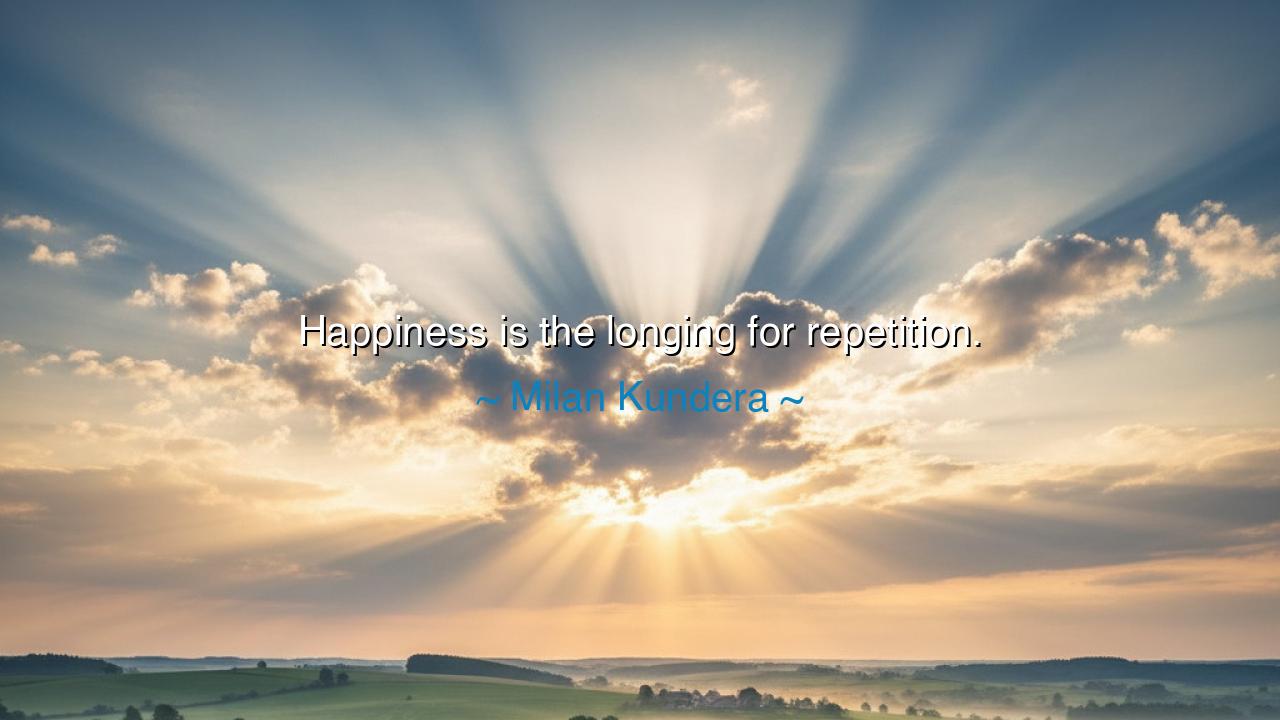
Happiness is the longing for repetition.






“Happiness is the longing for repetition.” Thus wrote Milan Kundera, the philosopher of memory and melancholy, whose words echo like the tolling of a distant bell. In these few syllables lies a truth so subtle that it hides beneath the laughter and sorrow of our days. For happiness, he tells us, is not born from novelty or abundance, but from the desire to live again what was once good, to touch once more the fleeting moment when the soul felt at peace. Repetition—that gentle cycle of what we have loved—is the secret rhythm of joy.
The ancients knew this truth though they spoke it in other tongues. They found comfort not in the new, but in the familiar—in the rising of the sun, the return of spring, the shared meal, the known song. For the heart delights in what it recognizes. To repeat is to affirm that something was worth returning to, that life has offered a sweetness we would taste again. The modern mind, restless and hungry, chases the new and calls it freedom. Yet, as Kundera reminds us, happiness lives not in constant change but in continuity, in the sacred desire to relive what once made life luminous.
Think of the old craftsman who shapes wood day after day, each motion the same yet never lifeless. His hands repeat what they have always known, and in that repetition he finds harmony. Or think of the mother who hums the same lullaby to her child each night—the melody never changes, but its tenderness deepens. These are the quiet sanctuaries of happiness, built not from newness, but from faithful repetition, where the heart knows where to rest.
History, too, gives us witness. When Nelson Mandela was imprisoned on Robben Island, his joy did not come from great changes or grand freedoms, but from the small repetitions that kept his soul alive. The morning prayers, the whispered songs, the steadfast routine of purpose—these daily patterns became the heartbeat of endurance. Even in captivity, he discovered that repetition could be salvation. It is not the novelty of life that sustains us in suffering, but the faithful rhythm of meaning repeated until it becomes eternal.
Yet, this truth bears a shadow. For when the cycle is broken—when what we love can no longer return—longing is born. That longing is both sorrow and happiness intertwined. To yearn for repetition is to acknowledge that something was beautiful enough to lose. Thus, happiness is never pure joy—it is the ache of wanting to live again a moment that cannot be reclaimed. And so Kundera’s words become both celebration and elegy, a song for the impermanence of all things we hold dear.
To live wisely, then, is to cherish repetition while it still graces our days. Do not despise the ordinary, for it is in the repeated that life gathers meaning. The morning coffee, the greeting of a friend, the laughter shared in the same familiar place—these are not dull routines but the golden threads of existence. To find joy in their return is to be truly alive.
The lesson is thus: seek not happiness in endless novelty, but in the deep savor of the familiar. Let gratitude transform your repetitions into rituals, your habits into hymns. When the moment passes, do not mourn it as lost—long for it, remember it, and know that in the longing for repetition, you are tasting the purest form of happiness. For the heart that can love what it has already known is the heart that has learned to dwell in eternity.






AAdministratorAdministrator
Welcome, honored guests. Please leave a comment, we will respond soon